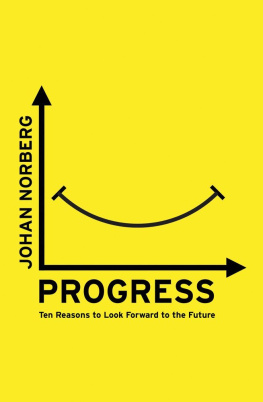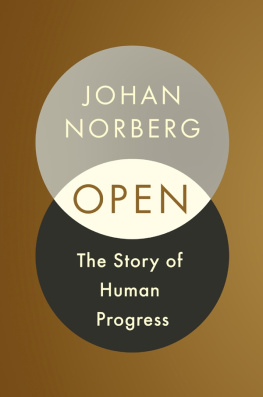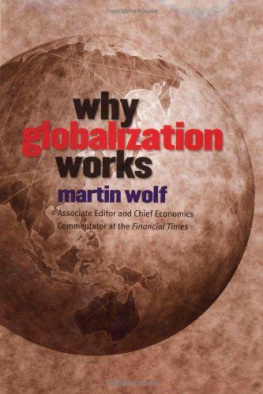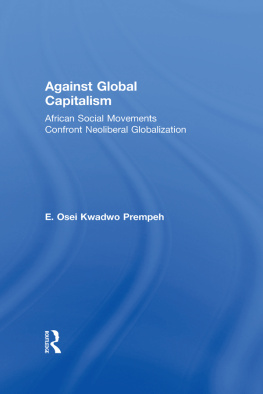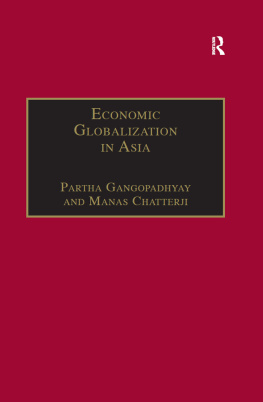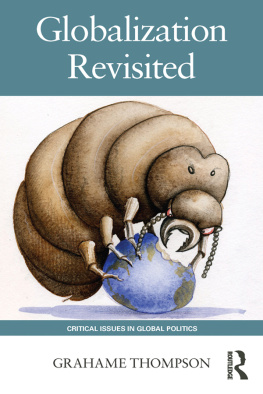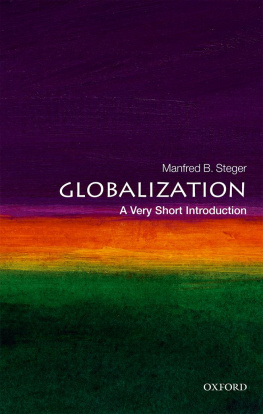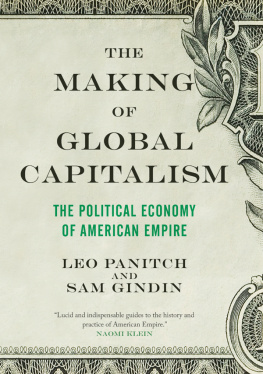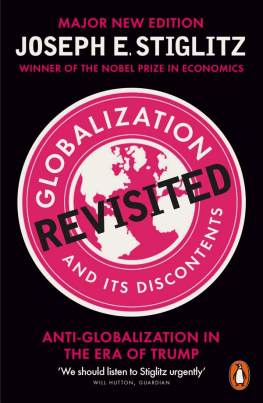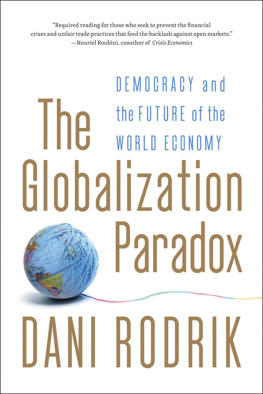Johan Norberg - In Defense of Global Capitalism
Here you can read online Johan Norberg - In Defense of Global Capitalism full text of the book (entire story) in english for free. Download pdf and epub, get meaning, cover and reviews about this ebook. year: 2003, publisher: Cato Institute, genre: Politics. Description of the work, (preface) as well as reviews are available. Best literature library LitArk.com created for fans of good reading and offers a wide selection of genres:
Romance novel
Science fiction
Adventure
Detective
Science
History
Home and family
Prose
Art
Politics
Computer
Non-fiction
Religion
Business
Children
Humor
Choose a favorite category and find really read worthwhile books. Enjoy immersion in the world of imagination, feel the emotions of the characters or learn something new for yourself, make an fascinating discovery.
- Book:In Defense of Global Capitalism
- Author:
- Publisher:Cato Institute
- Genre:
- Year:2003
- Rating:4 / 5
- Favourites:Add to favourites
- Your mark:
- 80
- 1
- 2
- 3
- 4
- 5
In Defense of Global Capitalism: summary, description and annotation
We offer to read an annotation, description, summary or preface (depends on what the author of the book "In Defense of Global Capitalism" wrote himself). If you haven't found the necessary information about the book — write in the comments, we will try to find it.
In Defense of Global Capitalism — read online for free the complete book (whole text) full work
Below is the text of the book, divided by pages. System saving the place of the last page read, allows you to conveniently read the book "In Defense of Global Capitalism" online for free, without having to search again every time where you left off. Put a bookmark, and you can go to the page where you finished reading at any time.
Font size:
Interval:
Bookmark:

Johan Norberg

Copyright 2003 by the Cato Institute.
All rights reserved.
Originally published in Sweden as Till Varlds Kapitalismens Forsvar (Stockholm: Timbro, 2001). Translated and revised edition published by the Cato Institute, 2003.
Translation by Roger Tanner with Julian Sanchez.
Library of Congress Cataloging-in-Publication Data
Norberg, Johan, 1973
[Till varldskapitalismens forsvar. English 1]
In defense of global capitalism / Johan Norberg.
p. cm.
Includes bibliographical references and index.
ISBN 1-930865-46-5 (cloth : alk. paper)--
ISBN 1-930865-47-3 (paper : alk. paper)
1. Capitalism. 2. Free enterprise. 3. Free trade--Social
aspects. 4. Globalization--Economic aspects.
5. Globalization--Social aspects. 6. Poverty--Developing
countries. I. Cato Institute. II. Title.
HB501.N6713 2003
330.122--dc22
2003055487
Cover design by Elise B. Rivera.
Printed in the United States of America.
Second printing: December 2003
Third printing: April 2005
CATO INSTITUTE
1000 Massachusetts Ave., N.W.
Washington, D.C. 20001
Our anarchist party won the school election!
It was the fall semester of 1988 at our schoolwe were about 16 at the timein a western suburb of Stockholm. As usual in an election year, we were staging a school election of our own. But my best friend Markus and I didnt believe in the system. Majority elections, to our way of looking at things, were like two wolves and a lamb voting on what to have for dinner. The school wanted us to elect someone to rule us, but we wanted to rule our own lives.
Partly, I suppose, we did it because we felt different from the others. I was into listening to electronic music and goth, preferably dressed in black and with my hair combed back. We wanted to play music and read books, while others seemed mostly preoccupied with owning the right accessories and fitting in. The right wing, it seemed to us, was upper class establishment, dead set against anything different. But we didnt feel any more at home with the left, which to us meant drab government bureaucracy and regimentation. Even if we preferred Sisters of Mercy and the Swedish punk singer Thstrom, it was John Lennons imagine theres no countries we believed in. Nation states should be abolished and people allowed to move freely, to cooperate of their own free will, everywhere in the world. We wanted a world without compulsion, without rulers. Clearly, then, we were neither right wing nor left wing, neither Conservatives nor Social Democrats. We were anarchists!
So we started Anarchist Front and put ourselves down as candidates in the school election on a radical, humorous ticket. We put up handwritten posters on the walls at school, asking things like: Whos going to run your lifeyou or 349 MPs? We demanded the abolition of the government... and of the ban on bikes in the schoolyard. Most of the teachers took a dim view of this, feeling that we were making a farce of the election, while we thought that we were making our voices heard in true democratic fashion. Being called to the headmasters office for a chewing-out merely strengthened our rebellious spirit.
We did well in a tough campaign, polling 25 percent of the votes. The Social Democrats came second with 19 percent. We were psyched, convinced that this would be the start of something big....
That was 15 years ago. In the meantime, I have changed my mind about a number of things. I have come to realize that questions concerning individuals, society, and freedom are more complicated than I then believed. There are too many complexities and problems involved for everything to be settled in one drastic Utopian stroke. I have come to realize that we do need some government to protect liberty and prevent the powerful from oppressing individuals, and I now believe that representative democracy is preferable to all other systems for this very purpose of protecting the rights of the individual. I realize now that the modern industrial society of which I was so wary has in fact made possible a fantastic standard of living and widespread freedom. But my fundamental urge for liberty is the same today as in that wonderful election campaign of 1988. I want people to be free, with no one oppressing anyone else, and with governments forbidden to fence people in or to exclude them with tariffs and borders.
That is why I love what is rather barrenly termed globalization, the process by which people, information, trade, investments, democracy, and the market economy are tending more and more to cross national borders. This internationalization has made us less constricted by mapmakers boundaries.
Political power has always been a creature of geography, based on physical control of a certain territory. Globalization is enabling us more and more to override these territories, by traveling in person and by trading or investing across national borders. Our options and opportunities have multiplied as transportation costs have fallen, as we have acquired new and more efficient means of communication, and as trade and capital movements have been liberalized.
We dont have to shop with the big local company; we can turn to a foreign competitor. We dont have to work for the villages one and only employer; we can seek out alternative opportunities. We dont have to make do with local cultural amenities; the worlds culture is at our disposal. We dont have to spend our whole lives in one place; we can travel and relocate.
Those factors lead to a liberation of our thinking. We no longer settle for following the local routine; we want to choose actively and freely. Companies, politicians, and associations have to exert themselves to elicit interest or support from people who have a whole world of options to choose from. Our ability to control our own lives is growing, and prosperity is growing with it.
That is why I find it pathetic when people who call themselves anarchists engage in the globalization strugglebut against it, not for it! I visited Gothenburg, Sweden, in June 2001 during the big European Union summit. I went there in order to explain why the problem with the EU is that in many ways it is fighting globalization and liberalization, and to present my view that borders should be opened and controls dismantled.
I never got the chance to give my speech. The place where I was to speak was suddenly in the middle of a battle zone, where so-called anti-globalization anarchists were smashing shops and throwing stones at police officers who were trying to defend a democratic meeting. These were anarchists demanding prohibitions and controls and throwing stones at people with different values, anarchists who insisted that the government retake control of people who no longer found themselves constrained by national boundaries. They made a mockery of the idea of freedom. To our cheerful Anarchist Front, people like that had nothing to do with anarchism. In our simplified teenage vocabulary, they were, if anything, fascists.
But that violence is only part of a broader movement that is critical of increasing globalization. In the past few years, more and more people have been complaining that the new liberty and internationalism have gone too far, giving rise to a hypercapitalism. The protest movement against this more global capitalism may call itself radical and profess to stand for exciting new ideas, but its arguments actually represent the same old opposition to free markets and free trade that has always been shown by national rulers. Many groupsauthoritarian Third World regimes and Eurocrats, agrarian movements and monopoly corporations, conservative intellectuals and new left movementsare afraid of a globalized humanity acquiring more power at the expense of political institutions. All of them are united in viewing globalization as a monster completely out of control, a monster that has to be rounded up and restrained.
Font size:
Interval:
Bookmark:
Similar books «In Defense of Global Capitalism»
Look at similar books to In Defense of Global Capitalism. We have selected literature similar in name and meaning in the hope of providing readers with more options to find new, interesting, not yet read works.
Discussion, reviews of the book In Defense of Global Capitalism and just readers' own opinions. Leave your comments, write what you think about the work, its meaning or the main characters. Specify what exactly you liked and what you didn't like, and why you think so.



